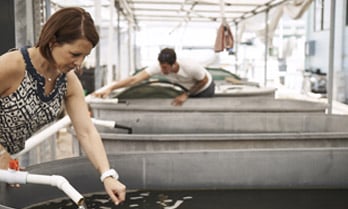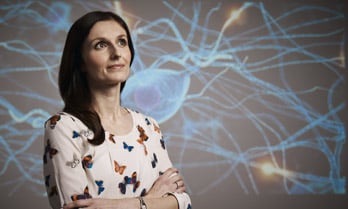Dr Kylie Mason, Walter and Eliza Hall Institute of Medical Research/Royal Melbourne Hospital
01 September 2012
New treatments for blood cancers
Kylie Mason has set herself the goal of developing new ways of treating diseases that are considered incurable.
Working as a clinician and scientist she is pioneering new treatments for blood cancers, some of which are already being clinically trailed in Melbourne. Her L’Oréal For Women in Science Fellowship allowed Kylie to look at ways to reduce the side-effects of the new drugs, and also to explore the role of platelets in cancer.
Qualifications
2007 PhD (Medical biology), The University of Melbourne/Walter & Eliza Hall Institute of Medical Research
1996 Bachelor of Medicine and Bachelor of Surgery, The University of Melbourne
Career highlights, awards, fellowships, grants
2011-present Honorary Fellow, Department of Medical Biology, The University of Melbourne
2007-present Victorian Cancer Agency Clinician Fellow, Walter and Eliza Hall Institute of Medical Research
2007-present Clinical teacher, The University of Melbourne (Royal Melbourne Hospital Clinical School)
2005-present Consultant Haematologist, Department of Clinical Haematology and Bone Marrow Transplantation, Royal Melbourne Hospital
2012 Melbourne Health Home Lottery Research Award, “Dependence of Haematological malignancy on pro-survival proteins”
2012 Leukaemia Foundation of Australia Grant -in-Aid, “Evaluating the efficacy and tolerability of targeting pro-survival Mcl-1 in vivo”
2011 – 2012 Victorian Cancer Agency Clinician Fellowship
2010 Leukaemia Foundation of Australia Research Grant -in-Aid, “Promoting cell death to improve treatment of Chronic Lymphocytic Leukaemia”
2009 Premier’s Award for Health and Medical Research, Victorian State Government
2009 Named in ‘Melbourne’s Top 100 Most Influential People’ – The Age Newspaper
2009 Specialist Certificate in Clinical Research (Oncology) First Class Honours, The University of Melbourne
2008 Young Tall Poppy Science Award, Victorian State Government
2007 – 2010 Clinician Researcher Fellowship in Cancer, Victorian State Government
2006-2011 Leukemia & Lymphoma Society of America Specialized Center of Research Grant, “Apoptosis in hematopoesis, leukemogenesis and therapy”
2006 Cleveland Young Investigator’s Award, Royal Melbourne Hospital
2006 Albert Baikie Memorial Medal, Haematology Society Australia & New Zealand
2005 – 2007 PhD Candidate, Walter and Eliza Hall Institute
2005 – 2006 Sessional Consultant Haematologist, Sunshine Hospital
2004 Fellow, Royal College of Pathologists of Australasia
2004 Fellow, Royal Australasian College of Physicians
2001-2006 Leukemia & Lymphoma Society of America Specialized Center of Research Grant, “Mechanism of Bcl-2 pro-survival function”
2001 – 2004 Advanced training in Haematology (Clinical and Laboratory), Royal Melbourne and Austin Hospitals
1997 – 2000 Basic Physician training, Austin Hospital
Top five publications
van Delft M.*, Wei A.*, Mason K.D., Vandenberg C.J., Chen L., Czabotar P.E., Willis S., Scott C.L., Day C., Cory S., Adams J., Roberts A.W., Huang D.C.S. (2006) The Bh2 mimetic ABT-737 targets selective Bcl 2 proteins and efficiently induces apoptosis via Bak/Bax if Mcl-1 is neutralized, Cancer Cell 10(5):389-399. * Joint first author (Impact factor 18.7, 404 citations)
Mason K.D., Carpinelli M., Fletcher J., Collinge J., Hilton A., Ellis S., Kelly P., Ekert P., Metcalf D., Roberts A.W., Huang D.C.S., Kile B.T. (2007) Programmed nuclear cell death delimits platelet life span, Cell 128:1173-1186. (Impact Factor 29.4, 193 citations)
Mason K.D., Vandenberg, C.J., Scott, C.L., Wei, A.H., Cory, S., Huang, D.C.S, Roberts, A. (2008) In vivo efficacy of the Bcl-2 antagonist ABT-737 against aggressive Myc-driven lymphomas, PNAS 105(46):17961-6. (Impact factor 9.6, 42 citations)
Mason K.D., Khaw S.L., Rayeroux K.C., Chew E., Lee E.F., Fairlie D., Grigg A.P., Seymour J.F., Szer J., Huang D.C.S., Roberts A.W. (2009) The Bh2 mimetic compound ABT-737 Synergizes with a Range of Cytotoxic Chemotherapy Agents in Chronic Lymphocytic Leukemia, Leukemia 23(11):2034-41. (Impact factor 8.6, 25 citations)
Schoenwalder S.M., Yuan Y., Josefsson E.C., White M.J., Yao Y., Mason K.D., O’Reilly L.A., Henley K.J., Ono A., Hsiao S., Wilcox A., Roberts A.W., Huang D.C., Salem H.H., Kile B.T., Jackson S.P. (2009) Two distinct pathways regulate platelet phosphatidylserine exposure and procoagulant function, Blood 114(3):663-6. (Impact factor 10.9, 54 citations).




